| |
Taken from Comic Watch (Jun 13, 2022)
The Rare Smells of P-Funk
Patricia Highsmash
Us Living in Fictional Cosmogonies
Part XXIX: The Rare Smells of P-Funk
by Travis Hedge Coke
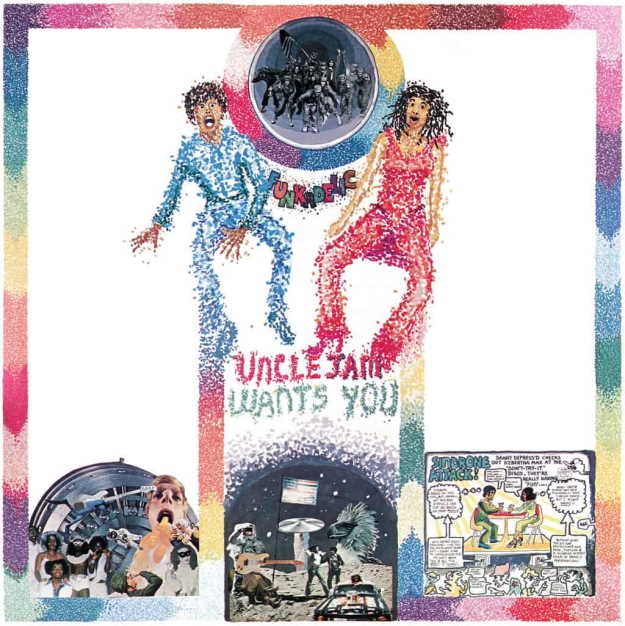
Funk is descriptive and prescriptive. |
"It ain't what you know, it's what you feel."
- Ride On, Parliament
"Funk," according to George Clinton, "is anything you need it to be to save your life."
While our visual and audial senses can often be refined to extreme precision, sommeliers, ganjiers, and the like are always kind of making it up. As someone once put it, the job of a sommelier is not to precisely identify elements in a wine or a wine's aroma, but to make those employing the sommelier happy. Most wine-tastings are communal experiences, not clinical trials. No one has ever said, "this is some good weed," pass a joint, and had the next person carefully confirm the the heritage, age, refinement, preparation and if someone did, would they get just as high or would it have burnt up before they got to it?
Some things are transitory and forever. You can, at once, be both, and they can still cancel each other out.
The Parliament-Funkadelic vibe, the funk of George Clinton and collaborators, features an expansive cosmogony of complex caricatures, repeating scenarios, heroic efforts and sad realities, a war that is play that is serious that is collaboration to rescue, preserve, promote, create, generate, sustain and love funk.
Perceived as a less aggressive form of Afrofuturism, the P-Funk mythology was, in Clinton's words, "a radical response to the American police state," and a recitation into form of the American politic could only come as intensely as the P-Funk analysis could, if it came in a semblance of being less aggressive.
Similar to Jack Kirby's Fourth Wold, the beings and happenings of the P-Funk truth are not necessarily limited to their existence as definite beings and definite occurrences, but are first and foremost concept-functions. Sir Nose d'Voidoffunk, the Syndrome, DJ Lollipop (aka Mr Prolong, the Lollipop Man, the Long-Haired Sucker), Countracula, the bop gun, Starchild, Thumpasorous are malleable, alterable, implied and inferred.
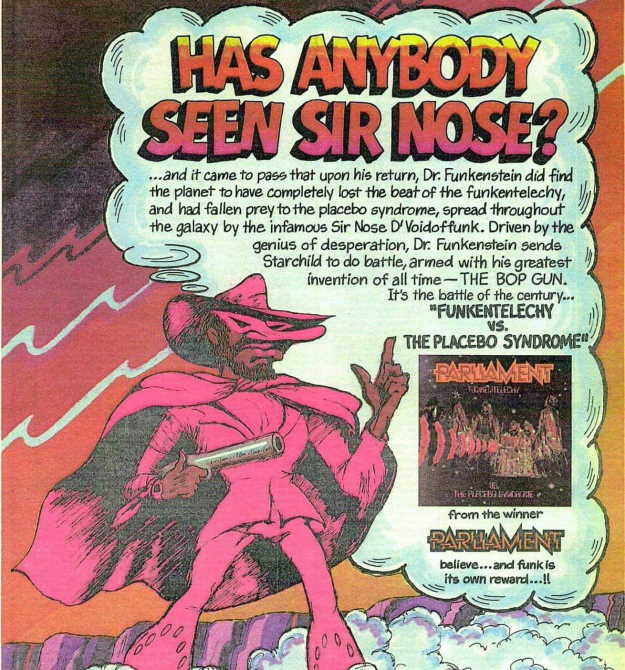
"If this had been an actual emergency, you would have been instructed to..." |
When Dr Funkenstein expounds, "Microbiologically speaking, when I start churnin', burnin' and turnin', I'll make your atoms move so fast, expandin' your molecules, causing a friction fire, burnin' you on your neutron, causing you to scream, "Hit me in the proton, Baby!" it is the resonance, not the reconnaissance, that most matters.
"The ass thou pimpest shall be your own! Cease all manner of exploitive jivation," is as self-directed an epistle as any.
In Sun Ra's 1974 film, Space is the Place, the Outer Space Employment Agency takes many and turns others away based not on accepted, standard American valorization, but a projected potential agenda. We have to project a potential. We have to reach because what we have at hand is unsatisfactory and lethal.
Nothing is deprived or lost in prioritizing Black voice in funk or Parliament-Funkadelic. Always a multiracial world and art, funk iconography was developed by Black men and other people. Funk is a Black American art.
Funk and P-Funk cannot afford the casual white-dominating causality of John Carpenter and Dan O'Bannon's Dark Star or the very white first thirty years of Star Wars. P-Funk deliberately put Black people where they were societally incongruous and culturally deserved: in the universe. Race was always in the question, ethnicity was always in the equation, culture was always counting.
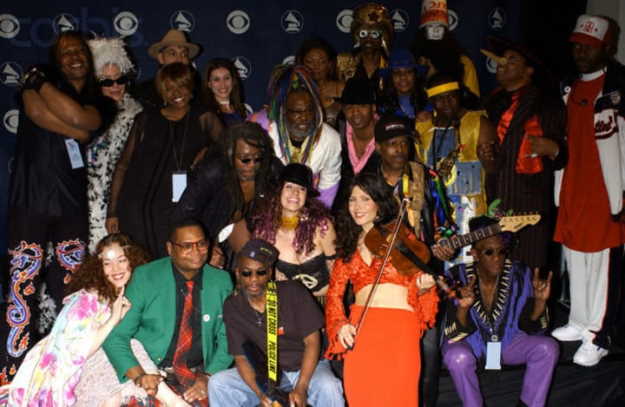
Only a few of the fabulous faces who bring you those fantastic sounds. |
Rock n Roll, in that it is different than funk, owes more than is readily admitted to Native Americans. Natives began and empowered rock music as early as Black innovators and as strongly. The Indianist movement of the late Nineteenth Century and early Twentieth is testament to how greatly Indigenous sounds and rhythms contributed to global culture and music. Antonin Dvojak, Frederick Burton, Arthur Falwell all took from what they perceived of Native American sound.
Funk is a Black American art. Anyone else, which is all of us in this world who are not Black, is on for the ride.
Eddie Hazel, George Clinton, Pedro Bell, Sly Stone, Bootsy Collins, Chaka Khan, Robert and Ronald Bell, Overton Loyd, Tamala Lewis, Barbarella Bishop, Junie Morrison, the Isley Brothers, Cynthia Robinson, along with non-Black contributors such as Muruga Booker gave long and glorious shape to a form unlocked from shape, unshaped from lock, eager in its transcendence, resplendence and water ballet in the three-dee of the mind.
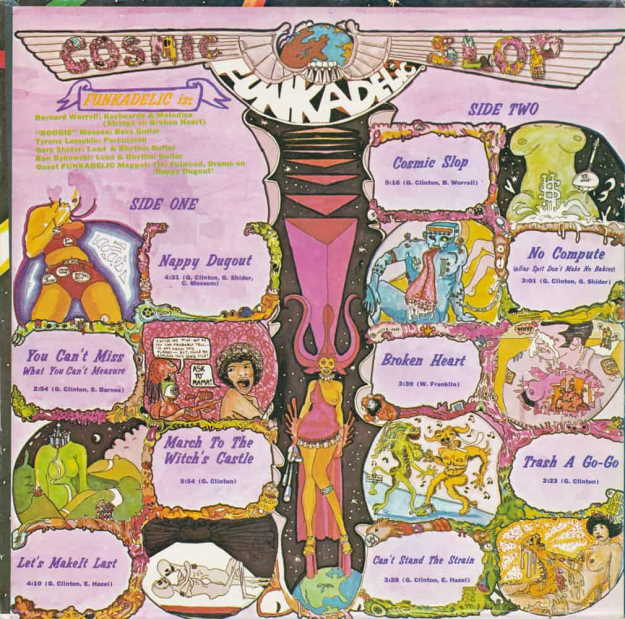
Learn to read the room, faces, and even small print. |
Funk comes out of the music and diktats of Black and Cherokee genius, Jimi Hendrix, and James Brown, who was Black, Native, and Asian. It is shaped in a Black identity for a Black culture.
"You've seen the bomb
Vietnam, LSD You've seen the E?
You've seen DNA
Watch them go to the moon, live on TV
The electric spanking of war babies"
It all comes around.
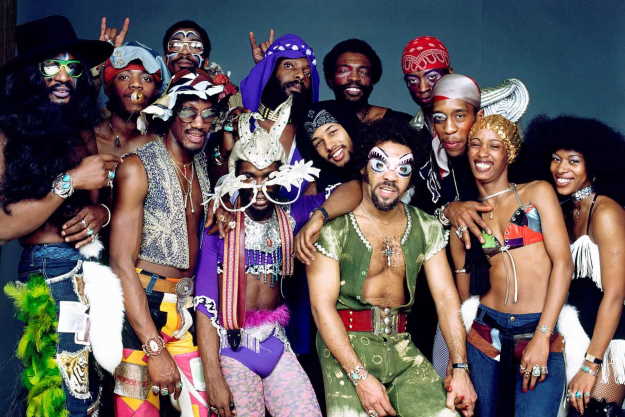
I'm just saying, somebody read a lotta comics maybe. |
Chocolate City, Parliament's 1975 album, named for its lead track, is the great political revolution in the place it will do the most good, not storming the halls, but radiant in your ears, your mind, your heart and your booty.
The unpleasant resonance of sexism in P-Funk lyrics can and has been justified as being not about real women, but she or women as metaphors for other things. Drugs, family, slavery, Earth, death, sex, time, the neighborhood, men. Chocolate City's Side Effects exhorts the listener and the singer to realize what is being stolen from them by good times and an inviting look. Let Me Be, from the same album, asks someone to both let them be loved upon flowers and canopies, to let the sky be the singer's sky, and to not speak, let the singer have their privacy, to not show their face or voice, moving from intimations of romance or unromantic love, to the singer watching people through a window as they are potentially watched through the window. All funk responds to those outside us, and to who is inside us. "The ass thou pimpest shall be your own."
In Chocolate City, Washington DC is acknowledged as a Black city, as a Black populace, and so, the United States. Removed are the government as known or sold, replaced not with professional politicos, but Richard Pryor as Minister of Education (a position the real world, as it were, United States did not provide), James Brown as Vice President, Muhammed Ali as President, Stevie Wonder as Secretary of Fine Arts (another position there is no comparable version of), and Aretha Franklin as First Lady.
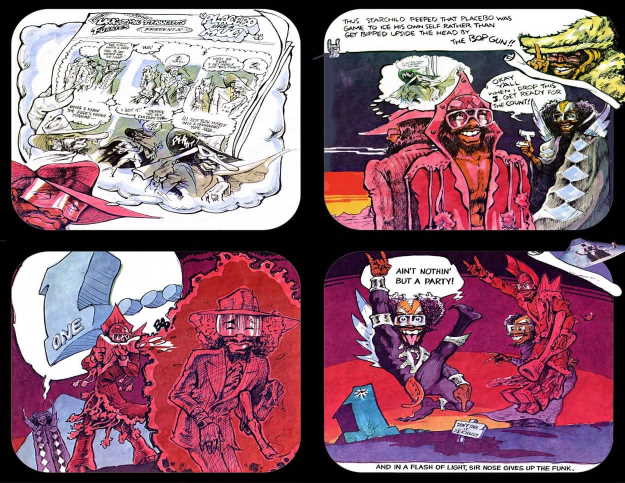
Can I interest you in a pamphlet? |
The emphasis on arts and education is revolution. The invocation of arts and education on a basic level and the highest levels of governance, is a revolution. That the position of First Lady is untethered from marriage or filial duty is revolutionary, while the position as one of the lady, may be or might less be.
Chocolate City's Ride On clarifies, "It ain't what you know, it's what you feel; Don't worry about being right, just be for real."
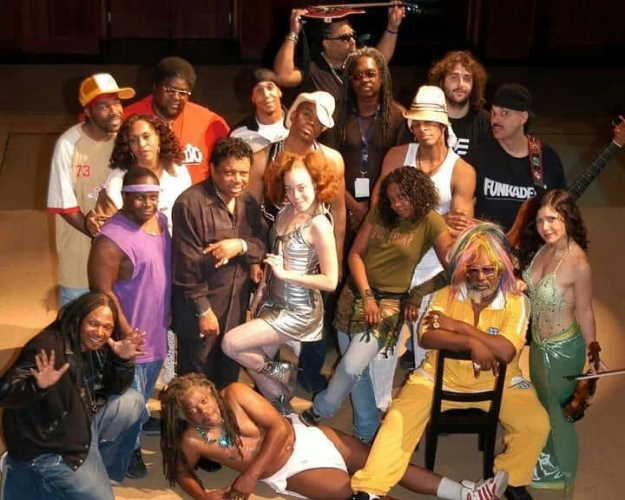
All futurism is now. |
P-Funk and funk are, like Clinton in the Prince movie, Graffiti Bridge, family-friendly and not at one time, in simultaneous and linked time. Like life, funk "not only moves, it can remove, dig?" Sir Lollipop assures us.
"Somebody say, 'Is there funk after death?' I say, 'Is seven up?'"
|
|